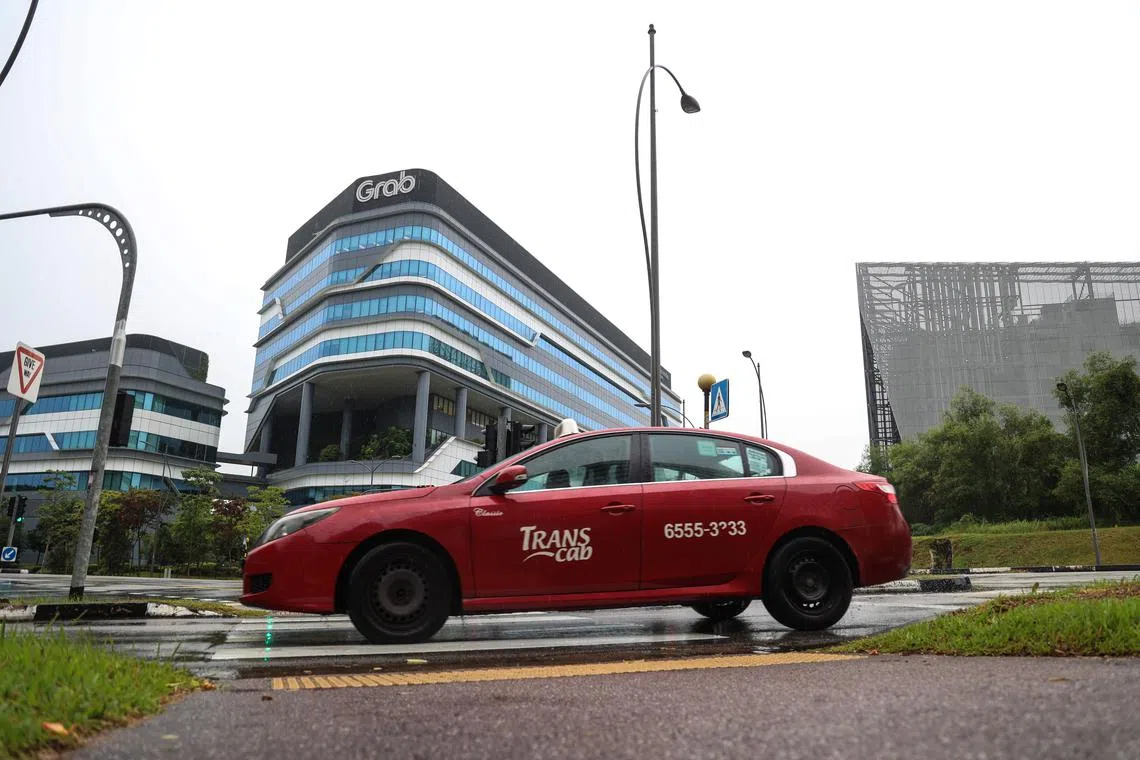Singapore’s competition watchdog raises concerns over Grab’s proposed takeover of Trans-Cab
Sign up now: Get ST's newsletters delivered to your inbox

Grab's proposed takeover of Trans-Cab could potentially raise barriers to expansion and entry for rival platforms.
PHOTO: LIANHE ZAOBAO
Follow topic:
SINGAPORE – Singapore’s competition watchdog has raised concerns over ride-hailing giant Grab’s proposed takeover of the country’s third-largest taxi operator, Trans-Cab, raise barriers to expansion and entry for rival platforms.
On Monday, the Competition and Consumer Commission of Singapore (CCCS) said that it had completed the first phase of its review of the proposed deal after looking over information from Grab and Trans-Cab, and taking in feedback from industry players and the public.
Based on this quick review, the antitrust regulator said it was unable to conclude that the proposed takeover would not substantially lessen competition, and it has raised its concerns about the deal between the two companies.
It added that the feedback it has received suggests worries over the effect Grab’s ownership of the Trans-Cab fleet may have on Trans-Cab drivers’ use of rival ride-hailing platforms.
This is despite licensed ride-hailing operators being barred from imposing exclusive arrangements that prevent their drivers from working for rival companies under the point-to-point transport regulatory framework.
“Accordingly, CCCS needs to review the competition effects of the proposed acquisition in greater detail,” the commission said.
It added that Grab and Trans-Cab may offer commitments to remedy, mitigate or prevent a substantial reduction of competition or any adverse effect arising from the merger.
If they do not, CCCS said it will proceed with a more in-depth Phase 2 review of the proposed takeover once it receives the relevant documents from the two companies. It will aim to complete this review within 120 business days, or about six months.
The companies may also offer commitments to deal with potential competition concerns at any time during this Phase 2 review.
If CCCS finds that the merger will result in a substantial loss of competition, it has the power to unwind the deal, modify it, or issue interim measures before making a final determination.
On July 20, The Straits Times broke the news that Grab would be buying Trans-Cab
The takeover is being helmed by GrabRentals – Grab’s car rental arm – and it includes about 2,200 cabs and more than 300 private-hire vehicles that Trans-Cab owns.
The deal also includes Trans-Cab’s vehicle workshop and fuel pump operations.
CCCS started its initial review of the deal on Aug 7 and began seeking public views a week after
In their submissions to the commission, Grab and Trans-Cab had said that the merger would not substantially lower competition in the platform and ride-hailing rental markets.
Among their justifications were that there are minimal overlaps between the two companies; drivers are free to use Grab or any other ride-hailing platform; and the number of drivers on Grab’s app is not expected to rise significantly with the takeover.
On Monday, a Grab spokeswoman said the company and Trans-Cab are committed to ensuring that the proposed deal benefits commuters and helps raise overall standards in the point-to-point transport industry.
She said digitalising Trans-Cab’s fleet would improve driver productivity and taxi availability, so that consumers can get a ride more easily, and driver earnings can improve.
Grab said both companies intend to abide by regulations that promote open competition and prohibit anti-competitive behaviour such as offering exclusive arrangements to drivers.
“This means that Trans-Cab drivers will continue to have the flexibility to earn through multiple ride-hailing platforms and pick up street-hail rides,” Grab said, adding that the firms’ priority is to work with CCCS to deal with the areas needing further review.
Trans-Cab founder and chairman Teo Kiang Ang told ST that he does not think the deal will have much of an effect on competition because his company does not have a majority in the taxi market.
There is also no way any company here can lock drivers into a single platform, he added.
Mr Teo said in Mandarin that the schedule of the proposed takeover would definitely drag on because of CCCS’ review.
“Never mind, I’ll just wait,” he added. “If the deal is approved, I will sell the company. Otherwise, I will just continue on with the business.”
National Taxi Association adviser Yeo Wan Ling, who earlier cheered the proposed acquisition and said it would improve the livelihoods of Trans-Cab drivers, said the union’s stance on the deal has not changed.
“We do think that there will be consolidation in this industry
However, as the dust settles on these mergers
If Grab were to successfully buy over Trans-Cab, the company would need to make sure that it respected the fees and contracts that Trans-Cab drivers are currently on, she added.
Ms Yeo, who is an MP for Pasir Ris-Punggol GRC, said the union is also keeping watch to ensure that Grab will allow Trans-Cab drivers to use other ride-hailing platforms if the takeover goes through.
She added: “If ride-hailing and taxis are going to be merged eventually, there needs to be choices for drivers and passengers.”
The proposed takeover of Trans-Cab comes five years after Grab and Uber were fined a combined $13 million for their merger, which the CCCS found to be anti-competitive.
According to data platform Measurable AI, Grab had a 50.2 per cent share of Singapore’s ride-hailing market as at March 2022 – ahead of Gojek at 17.7 per cent and ComfortDelGro, Singapore’s dominant taxi operator, at 15.1 per cent.


